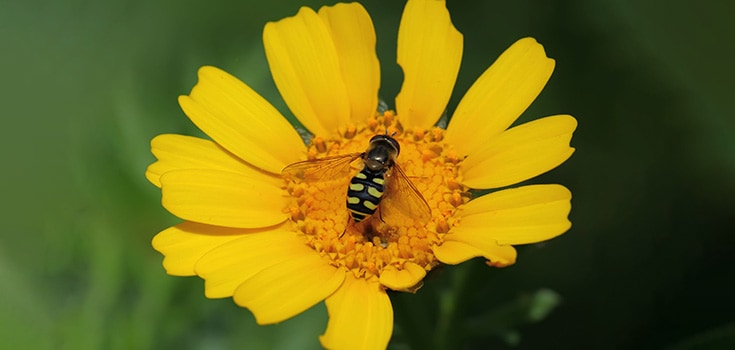Pesticides Destroy Bees’ Ability to Carry Pollen, Protein

Pollen, though irritating come spring time, is crucial to the health of bees. And bees are crucial to the health of plants, and therefore humans. But research shows commonly–used pesticides are destroying bees’ ability to carry pollen, their only source of protein and truly their life’s work.
According to The Guardian, the research comes during a two-year ban on the pesticides in question in the European Union. The ban includes three neonicotinoids, the most popular pesticides in the entire world. Temporarily banned because of their risk to bee populations, experts are calling for a permanent ban and one that encompasses the globe.
But experts aren’t the only ones voicing concerns. Just recently, it was announced that thousands of individuals are going to swarm Lowe’s and Home Deport in protest, demanding that the stores stop selling chemicals linked to bee destruction.
The research from Professor Dave Goulson and his colleagues with the University of Sussex reveals the use of these toxic formulas actually halves the pollen collection abilities of bees.
“Pollen is the only source of protein that bees have, and it is vital for rearing their young,” said Goulson. “Collecting it is fiddly, slow work for the bees and intoxicated bees become much worse at it. Without much pollen, nests will inevitably struggle.”
More than 75% of the world’s crops require pollination by insects. Bees remain the biggest pollinators, but bee populations are falling, and neonicotinoids are one part of the problem.
Published in the journal Ecotoxicology, the study found that bees exposed to neonicotinoids brought back pollen on only 40% of their journeys from home. Those who hadn’t been exposed came back with pollen 63% of the time. Further, those exposed to the pesticides carried an estimated 31% less than those who weren’t.
“This work adds another piece to the jigsaw,” said Hanna Feltham, another researcher on the project. “Even near-infinitesimal doses of these neurotoxins seem to be enough to mess up the ability of bees to gather food. Given the vital importance of bumblebees as pollinators, this is surely a cause for concern.”
For their part, the pesticide industry says studies like this are not worthwhile because they don’t accurately replicate field conditions. They say bees in these studies are exposed to higher levels of pesticides than those in the wild, suggesting there might be a “safe” level of exposure.
While it’s true that field studies are needed, where bees forage naturally and are not force-fed solutions laced with neonicotinoids, the analysis from those who make their millions off these pesticides is far from trustworthy.
